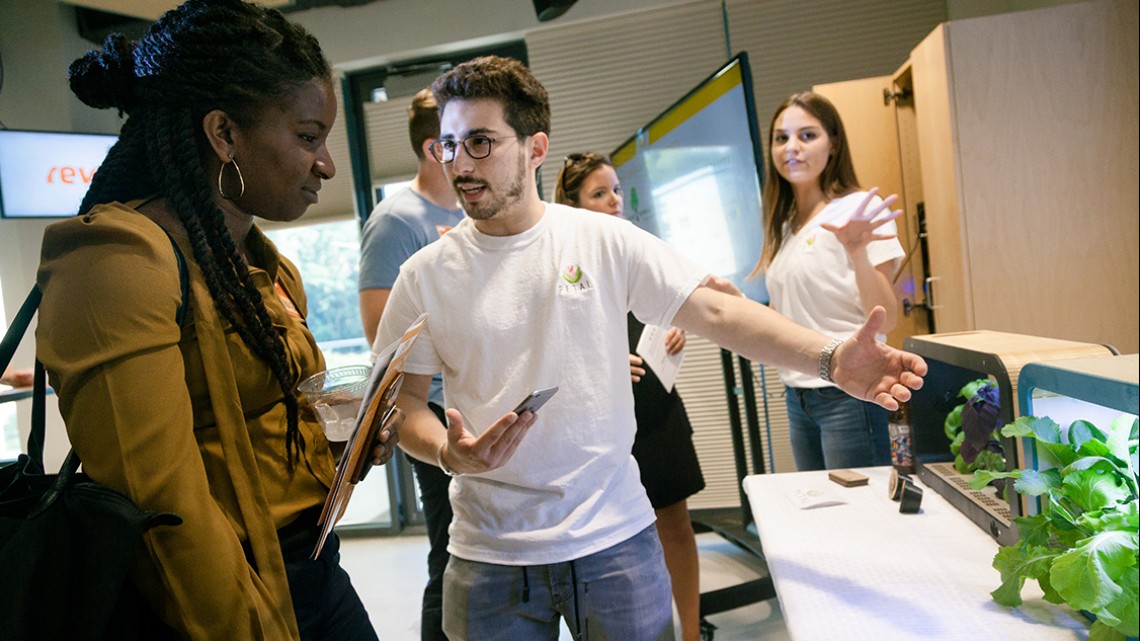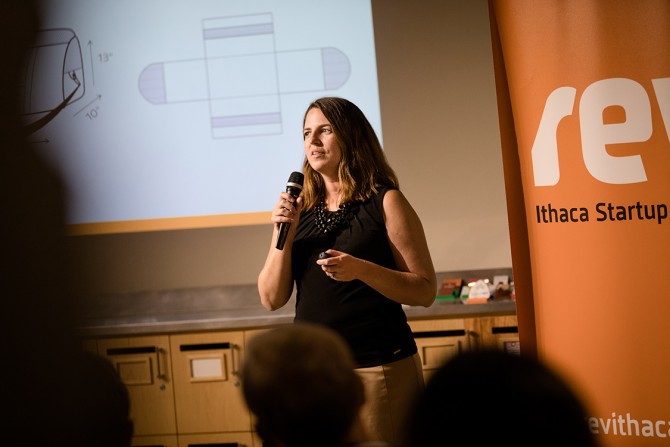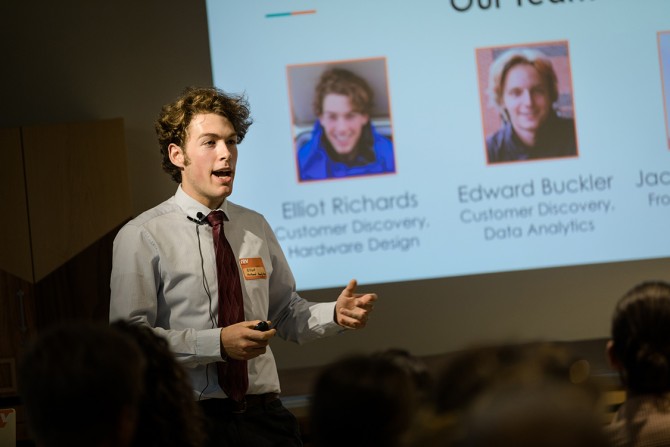
Hotel School student Liad Hare ’18 of team Petal discusses his project during Rev: Ithaca Startup Work’s Hardware Accelerator Demo Day, Aug. 10.
Hardware accelerator teams Rev-up product ideas at Demo Day
By Adriana Condarco-Quesada
What do cat carriers, multifaceted keyboards and genetically engineered bacteria have in common? They are all products brought to life during this year’s summer hardware program at Rev: Ithaca Startup Works.
“The Hardware Accelerator Program provides critical resources for product entrepreneurs at the earliest stages of prototype development,” said Rev Director Ken Rother. “The program is about more than just showcasing the prototypes developed over the course the summer; it’s about creating entrepreneurs with the skills needed to take their idea to market.”
The third annual Demo Day event, held Aug. 10 in downtown Ithaca, provided the eight newly graduated teams with an opportunity to unveil their product ideas that took shape over the course of the intensive 11-week program. This year, the teams consisted of undergraduate and graduate students and staff from Cornell, students from Ithaca High School, and a local business owner.
Approximately 180 people attended the event, giving the public a chance to see the fruits of the teams’ labor and budding entrepreneurs the opportunity to practice their pitches with a captive audience.
“The teams are constantly growing and learning about what it takes to build a prototype and become an entrepreneur,” said Brian Bauer ’85, entrepreneur in residence at Rev. “The hardware accelerator experience is a powerful mix of technical and creative design challenges that prepare teams to take their prototypes to the next stage of development.”
One team that learned about the value of the customer discovery process was Foodopia. The team set out to solve a large-scale food waste issue but pivoted to focus more on everyday consumers, specifically those who share a refrigerator with roommates, which can often create a sticky (and stinky) situation.
“We learned important lessons: Don’t solve our problem, but listen to the customer. Listen to feedback. Try not to be defensive,” said Foodopia lead designer Mincong Liu, an engineering doctoral candidate.
Sustainability was a prevalent theme among several of this year’s teams. Graduate students Hailey Scofield and Nathan Oakes joined forces to create Combplex, a remote monitoring system to help beekeepers better manage their colonies and detect early signs of critical issues such as colony collapse disorder.
“I didn’t see myself as an entrepreneur before entering the program,” said Scofield. “The hardware accelerator gave us the business and technical expertise we needed to translate our research into a practical solution that has the potential to save billions of honeybees.”
For many teams, their journey won’t stop here.
“Hardware accelerator alumni from previous years have gone on to launch companies, raise capital and create jobs. Demo Day is the just beginning for these teams, and we look forward to supporting them in the future,” said Rother.
The other teams presenting included:
- Cornell iGEM has developed genetically engineered bacteria that offer more control over chemical processes, which can be beneficial to microbreweries, waste-water treatment plants or controlled-environment agriculture.
- HPM Technologies is creating a tool for small IT providers, giving them a more reliable way to remotely access clients’ computers, saving time for technicians.
- Outland Analytics is creating a monitoring system that will give federal agencies and private property owners a cheaper and more effective way to track and identify illegal off-road vehicle use.
- MeWow is enhancing feline health and wellness with a streamlined, multifunctional carrier that can become a staple of a cat’s everyday environment.
- Petal (Okavango Systems) is working to provide small-space food-growing systems to give city-dwellers greater access to high-quality produce.
- Prometheus is designing a multifaceted keyboard that aims to revolutionize the way consumers interact with their computers, offering users the option for a touchscreen display and allowing room for customization of design layout and button utilities.
To learn more about the teams and their prototypes, visit the Rev website.
Adriana Condarco-Quesada is a regional economic development specialist for the Center for Regional Economic Advancement.
Media Contact
Get Cornell news delivered right to your inbox.
Subscribe
